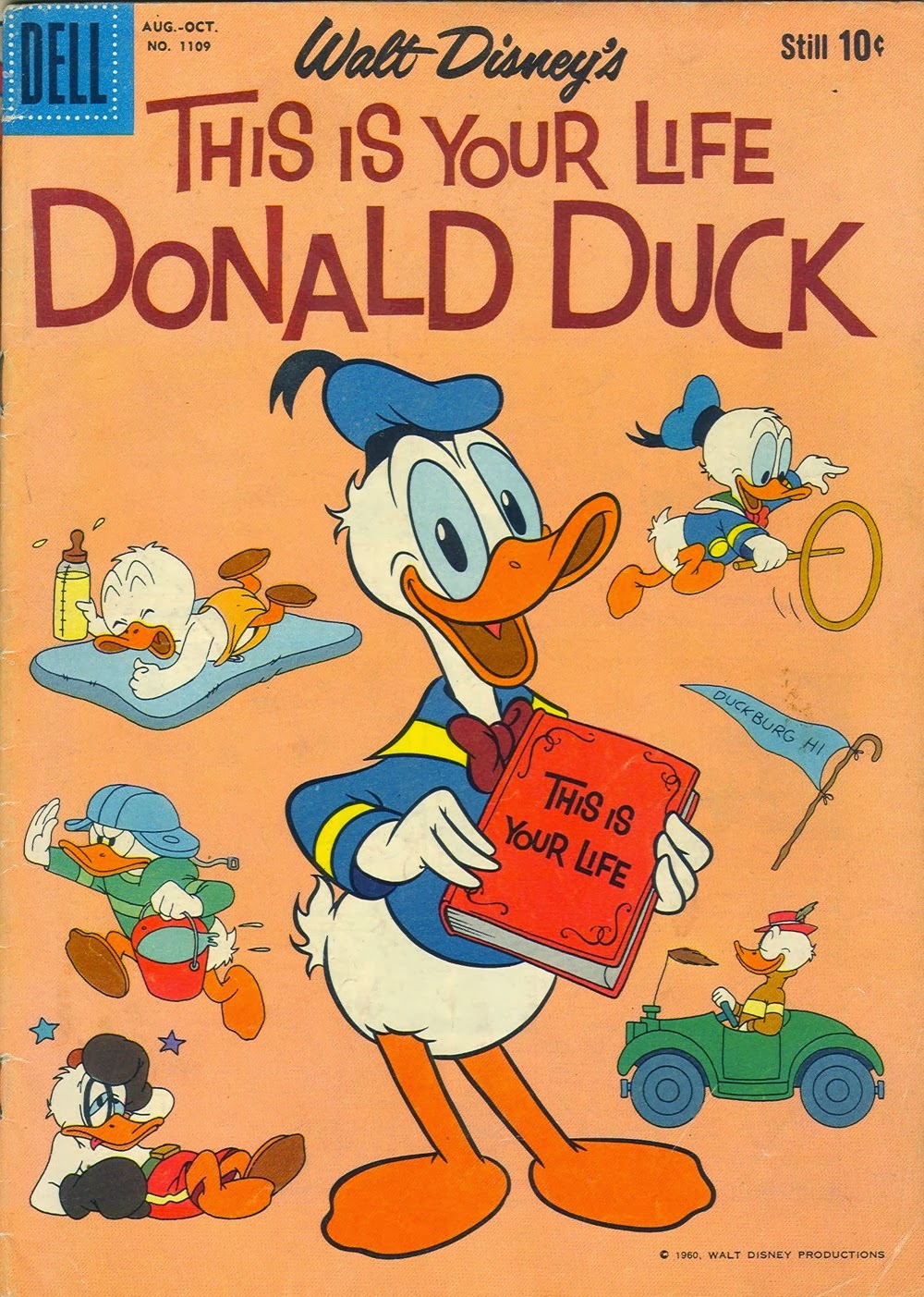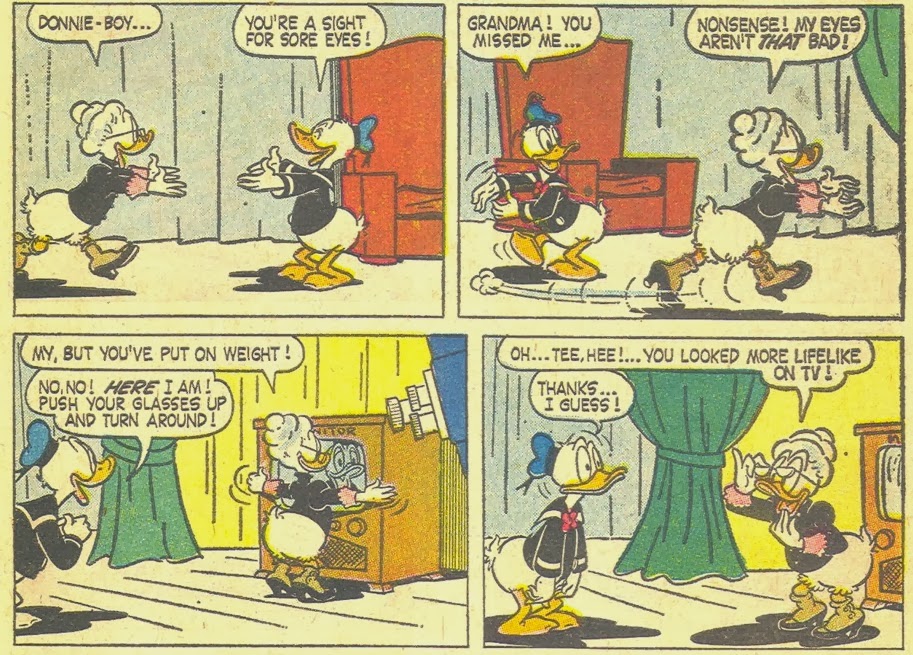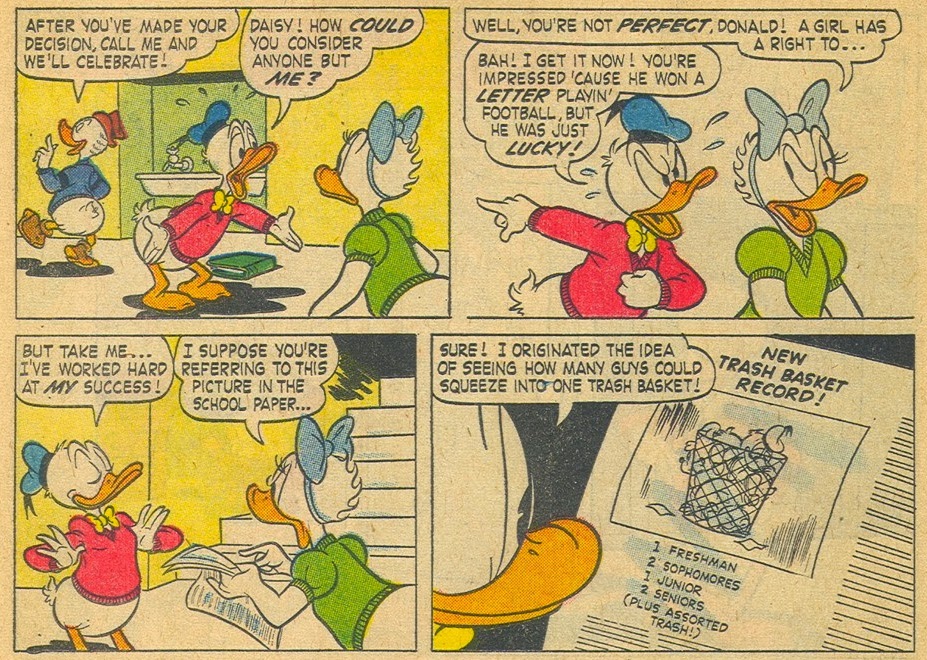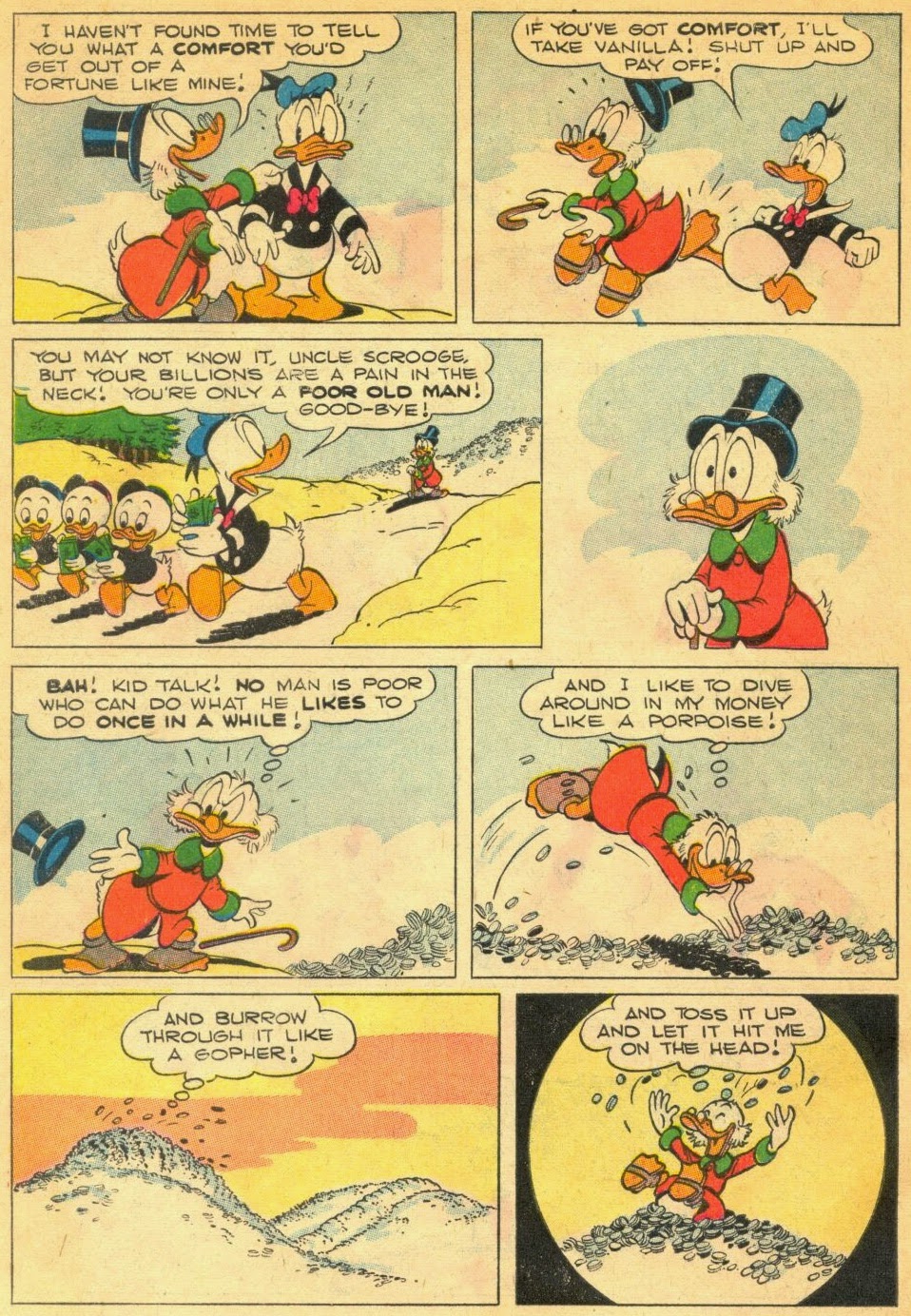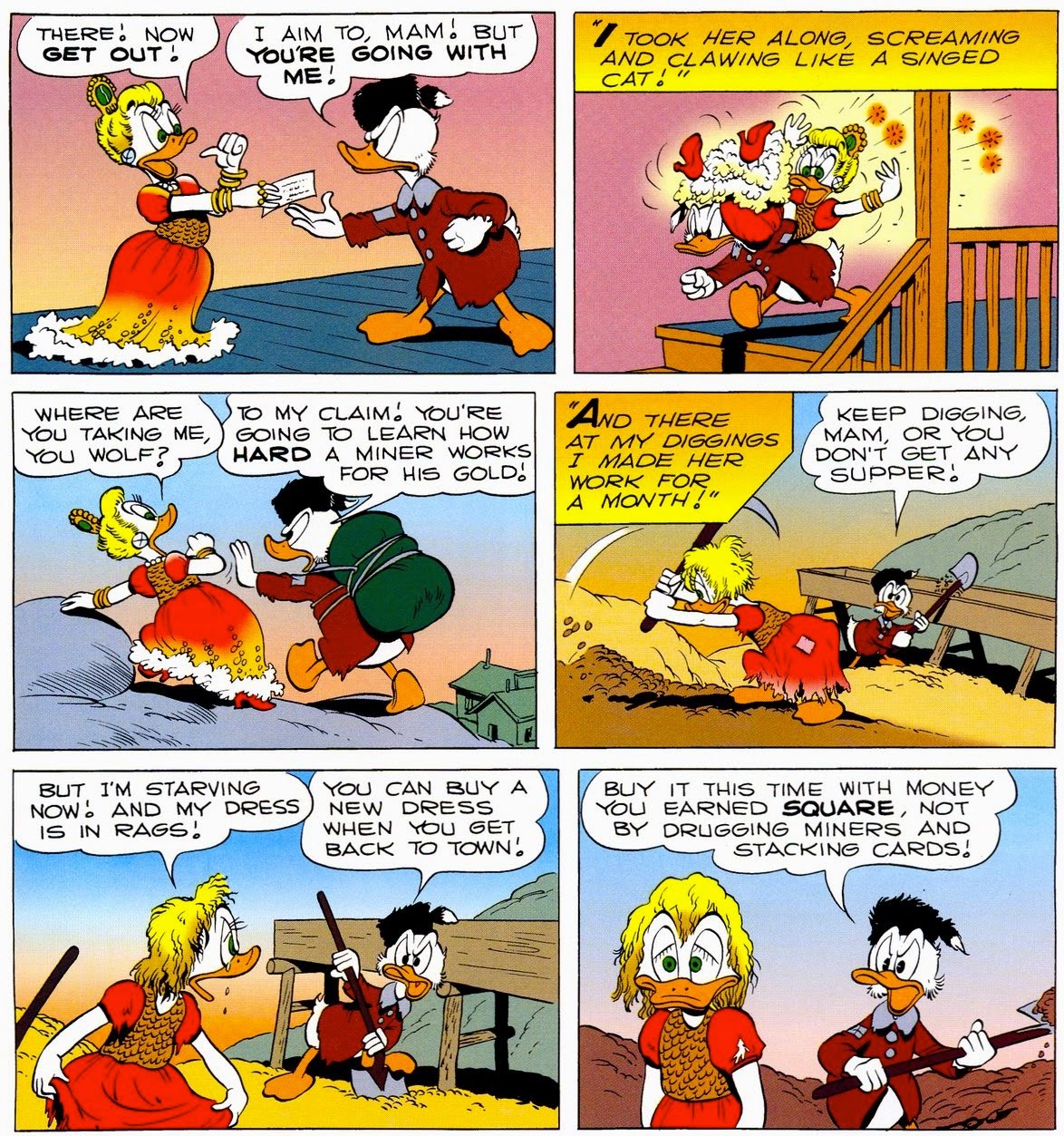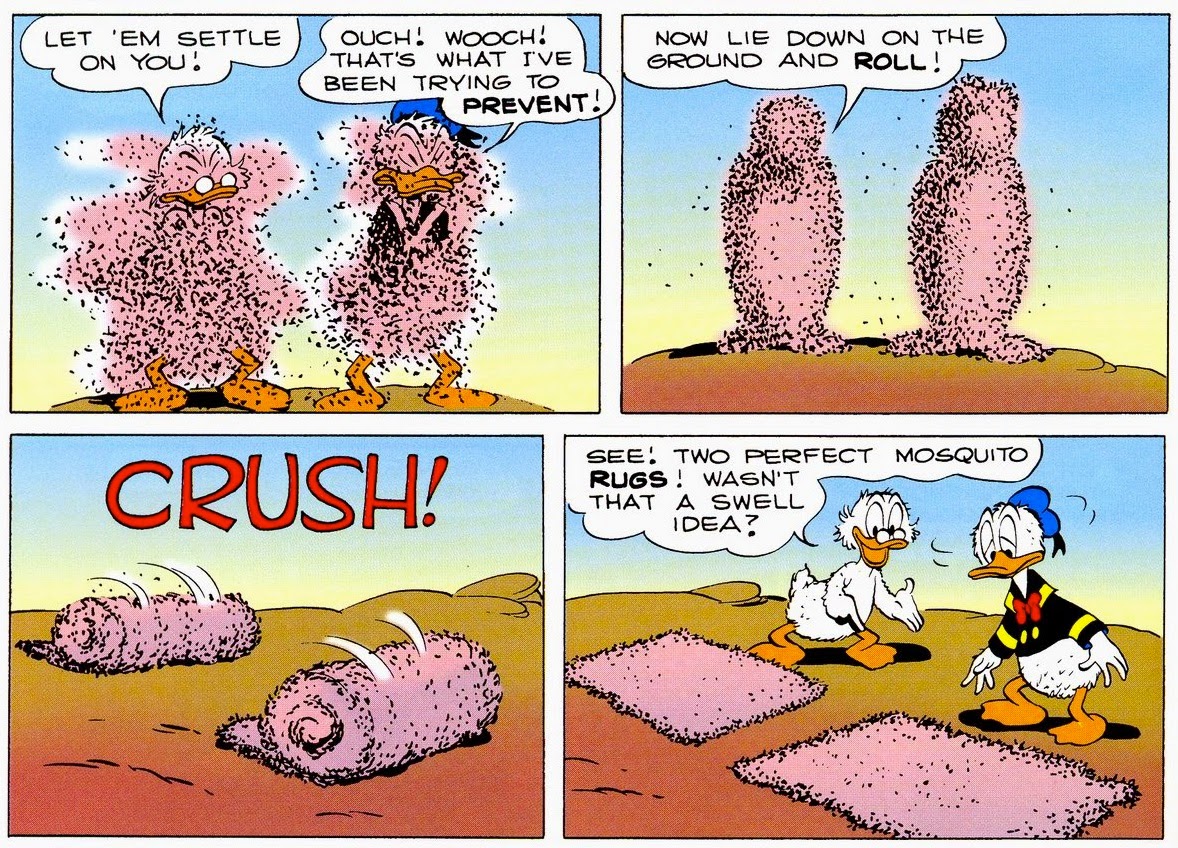It's no joke: I am so excited about this one I can barely
breathe. The story is
"Donald Fracas." The translation is by me. The place to download it is
right the fuck here.The story is based, extremely loosely I'm guessing, on a
novel by Théophile Gautier. But that is neither here nor there. I do not know what Guido Martina was thinking when he wrote this story: whether he was really going for something special, or whether it was just business as usual. Certainly, the issues of Topolino in which it was originally published look pretty much like the usual thing. However, it certainly
feels as though it's meant to be an Extravaganza. And I'm not the only one who thinks so; the
source I used for my translation is a magazine celebrating Walt Disney's centennial ("100 years of magic," it says, which seems questionable--how much childlike wonder was three-year-old Walt invoking?).
Part of the reason for this--obviously enough--is that the story features characters from
three different classic Disney films. I kinda feel like it should be a
surprise when they come up, but the story spoils who they are in its title panel:
OH WELL.
Now, chances are good that you are, at best, indifferent to the idea of Snow White & Co appearing in a duck story. Very likely, you're actively antipathetic to the idea. When I was introduced to the concept, I kind of grumbled: what is this madness? Why is this here? Oh well; I claim to like weird-ass Italian stories, so I'd better read it. And then I was quite taken with it--so much so that the cheap digest I'd first read it in wasn't
good enough, and I bought the magazine with the better printing so I could do the translation. I certainly would not like it if
all--or even more than a very few--of my duck stories did this kind of crossover thing, but I feel it adds a certain je ne sais quoi to the story, and reinforces the idea that you're reading something
special.However, while the use of movie characters might be the way the story initially draws attention to itself, it's
not the reason that I think it's the best story I've ever read by Guido Martina as well as the best story I've ever translated--both by some margin. No--that would be because I feel it does incredibly
well by its protagonist. Look at other stories I've translated--look at pretty much
any of them, with the partial exception of "Marco Polo." I like them. They're fun stories to read. Otherwise, I wouldn't have spent so much time with them. But it seems undeniable that they are more or less indifferent to Donald himself. They bat him around for a while, have him lose his temper or act dumb, and there's your lot. Maybe he gets a reasonably happy ending or maybe not, but as a reader, your sympathies aren't very highly engaged. They are certainly not
character pieces.
"Donald Fracas," however, is completely different. This story is all
about Donald as a character, and before I read it, I would never have imagined that Martina could treat the character so sympathetically. Basically (as you know if you've read it already, and if not, you really ought to), Donald lets his temper get the best of things and fucks things up, and then has to deal with the guilt from that and fight through his fears in order to do what he has to do and be the person he wants to be--all without losing his essential Donald-ness. And in the end, he emerges wholly triumphant. That's another part of the reason that this story feels like it was meant to be special: Martina simply does
not write things like this--except, apparently, when he does.
Point is, I recommend it. I think it deserves to be counted among those semi-legendary, never-published-in-English stories.
It should also be noted that this is by far my most restrained translation. That wasn't a conscious decision or anything; it just felt, somehow, as though the script was
richer than those of other stories I've worked on, and that embellishing it excessively would've been gilding the lilly. That's not to say that I didn't take liberties when necessary, but you won't find too much pop-culture zaniness here. I
did re-watch
Snow White and the Seven Dwarfs, Pinocchio, and
Alice in Wonderland in order to get the characters' voices right to the best of my ability. As it happens, the Cheshire Cat--while the best thing in
Alice in Wonderland--doesn't really have enough dialogue to give one a clear idea of exactly how he should speak. I just tried to make his dialogue suitably strange. The lines he's always quoting from "Jabberwocky" are my addition, following the movie.
(The two French versions I read have similar but different translations--in the earlier one, the Cat is referred to as "Lucifer"--ie, the cat from Cinderella. You really, really have to wonder how that could have happened. Did Martina
himself fuck up, or was if something bizarre with the translation? That would be pretty egregious on Martina's part, but on the other hand, how the
hell could you screw that up in translation? Anyone who's read it in the original Italian: tell me!).
See? Burning the catnip is just spiteful and irrational, and it sets the entire plot of the story in motion.
Snow White and the Seven Dwarfs! Though truthfully, it would very easily be Snow White and the
Two Dwarfs. When I re-watched the movie (and
goddamn is it a great movie), I quickly realized that when you come right down to it, only Grumpy and Doc have really distinctive voices. Martina seems to have likewise noticed this, as those two get virtually all the dwarf dialogue in the movie. Sleepy and Sneezy get a few desultory bits involving, uh, being sleepy and sneezing, respectively. Happy gets a few generic lines. Dopey and Bashful?
Nothin.' Still, I'm not complaining; it surely would not be easy to give substantial screen-time to all seven, especially given that most of them have pretty limited personality-gimmicks.
(As I noted on facebook recently, Doc is named "Prof" in French, which very likely answers the pressing question of whether he's meant to be a
medical doctor or just a PhD.)
The question of just when the hell this is supposed to take place in relation to the movie is an open one. In the original, it was the Evil Queen
herself who cursed Snow White; having it be someone else is one of very few substantial changes I made to the story (which I could do with impunity since she never actually
appears), 'cause dammit, the queen
dies at the end. She falls off a mountain, a huge boulder falls on her, and the vultures swoop down to feed. Sure, you don't see her
mangled corpse, but show me the dead Disney villain you
do see. Alternatively, we could assume this is meant to be taking place
during the timeframe of the movie, and this is just a part that, uh, the movie forgot to include; that would explain why Snow White isn't with her personality-challenged prince, but it's also
super-lame. It's a dilemma for anyone wanting to expand the Snow White story, the same as for Beauty and the Beast: the parts of the movies that people like and would
want to see more of are no longer operative by movie's end. So what do you do? I think Martina's strategy of basically just ignoring the question is probably the right one.
"Fracas" in French and Italian is a verb meaning "smash." In English, it's...not. "Donald Smash" would sound pretty dumb, and entirely too Incredible-Hulk-ish. It was necessary to sort of finesse things.
Oh, and here's the one bit of the story that I just found genuinely baffling. The monkey talks with its
stomach? What? I was seriously thinking of just breaking the shit out of the fourth wall and noting in that lower-left narration box that this is just gibberish, but I decided to do the decent thing and try to brazen my way through.
Definitely a bit more
violent than your average Disney story, with characters earnestly attempting to murder one another.
So is this dude supposed to be
serious, or is it just a lame excuse? You would
think it's the latter, but you have to allow that it's really, really hard to
know in stories like this.
Ah, yes. Honest John and Gideon. Okay, fine. I think Pinocchio is one of the most overrated Disney films, but I don't mind. BUT…well, if you buttonholed a bunch of people and asked them to name
one trait of Gideon from Pinocchio, you know
bloody well that
one hundred percent of them would say "DOESN'T TALK." So what does Martina have him do here? Yeesh. It's a wonder he doesn't have
Dopey soliloquizing. Reminds me of
that Christmas Carol story I rewrote, where the Ghost of Christmas Yet to Come had dialogue, but in that instance, I was able to more or less solve that problem. Here, there's just no getting around it: Gideon has multiple lines of dialogue. I figured that maybe if he had a stutter, it would explain why he never said anything in the movie. Eh…what can you do?
That IS a cool image, though, you've got to admit. Scarpa's art overall is quite
good here, though you will inevitably note that his ducks are wildly inconsistent-looking. I've never known a comic artist whose art was quite as endlessly variable as Scarpa's.
Note that I have Donald calling the dwarfs in order from best to worst. I know some might cavil at me putting the nondescript Happy in the middle, but I think Sneezy and Sleepy lose big points for not even having
personality traits to fall back on, just physical reactions; and I always just want to tell Bashful, man, give it a
rest.For a while, I kept thinking that the owl was another movie character that I was somehow forgetting, but
this listing of Disney owls (of COURSE the internet has a listing of Disney owls!) disabused me of that notion. He's called "Magus Gufus" in the French version, but if I called him that, you'd be confused and disoriented when he wasn't played by
Goofy.Okay, it may not be a fair challenge, but sheesh--asking Donald to do a thing like this in order to save the girl. That is
hardcore. And he does it! He doesn't like it, but he does it. And that's what I like about this story. Our guy gets some serious hero cred, and it feels
earned.Just don't even
ask about the weird deus-ex-machina things the catnip does. Just. Don't. Ask.
Nor should you ask about why the hell the Cat's treasure turns out to be key, or whether the blindness cure would've worked if Donald
hadn't happened along with all this pure-of-heart stuff. Instead, just note that this whole scene is beautiful and oddly poetic. The owl's true form is a
comet. Fancy that.
The story sort of
flirts with the "it was all a dream!" business, but thankfully, it never does any more than that.
Boy that would be lame!
Well hey--this may be an atypical offering from Martina, but he just wouldn't be he if he didn't show Scrooge acting completely psychotic. It can't be denied that this anger feels a
bit forced. But Scrooge collecting ancient weapons? Eh--could be. After all, we've seen in Barks plenty o' times that he collects sundry cultural artifacts.
So much for earning it square, eh? I like the way HDL are so emphatically on Donald's side.
…AND I like the way they achieve TOTAL VICTORY. It was just
one thousand in the original, but that did not seem like enough to me. Upping the amount doesn't change the emotional tenor.
Seriously, I
love this damn story. Please tell me if you know of any other Martina stories that treat Donald similarly. I wanna
read that shit.



















































































